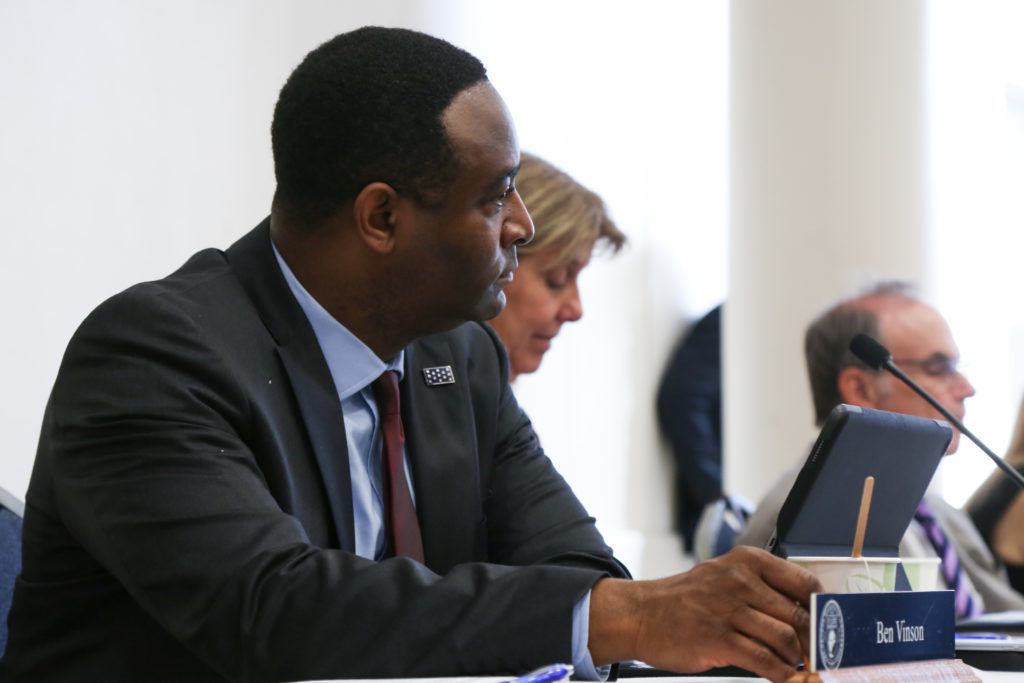The academic advising office is trying to get more students ready to apply to law school.
Although GW doesn’t offer a pre-law major, officials added more one-on-one advising and boosted social media outreach this semester in an effort to prepare students for law school. Students and academic advisers said the new updates give students more ways to explore whether a legal career is the right fit for them and more guidance on how they can craft their undergraduate courses to prepare for law school.
Marcus Ware, who began working this semester as the pre-law academic adviser in the Columbian College of Arts and Sciences, said this year the school’s advising office has started offering office hours at nontraditional times, giving students advice about their career path even if they aren’t available during the day.
“Every year there are students who are applying to law school, which I know because I see the data, but we don’t get to see them,” Ware said, referring to the advising office. “These are opportunities after hours for small groups of students and alumni to come and have small group discussions about the law school process.”
“It’s wise for students to have multiple paths.”
Last spring the amount of law school applications at GW increased following President Donald Trump’s election and the school’s decision to waive its application fees. The school consistently attracts among the highest number of applications in the nation.
Ware added that this semester the new advising schedule has “dramatically increased” the number of students that use the office to plan out their law school ambitions.
The University also uses its pre-law website to give students additional resources, like a checklist of items for students to complete in preparation for applying to law school.
“The number of students coming to college thinking they will be lawyers and the number who go on to law school is a fraction of that number,” he said. “It’s wise for students to have multiple paths.”
In place of a pre-law major, the University offers a law and society minor through the sociology department that combines law-related courses at the undergraduate level.
Ware also launched a mentorship program this semester, in partnership with the Student Bar Association, to match students and alumni interested in law school with mentors in the school.
“It’s really just offering programs, events and support services that students want,” he said.
University spokesperson Jason Shevrin said although there are no plans to create a formal pre-law major, resources like the new pre-law Twitter account, which launched in October and posts about networking opportunities across the University, encourage interaction with law-minded students by making them more aware of the resources available.
“The Twitter account @GWPreLaw is one of many ways the Undergraduate Academic Advising office of the Columbian College of Arts and Sciences interacts with students interested in pursuing law school after they complete their undergraduate degrees,” he said in an email.
Students interested in attending law school said the changes are helpful in determining what major they should pursue as an undergraduate.
Pre-Law Student Association President Zachary Sanders said students interested in a law career often don’t know what major to pursue, and a law-specific undergraduate degree can make a student less unique in a law school applicant pool or not expose them to other interests.
“Thinking back to my freshman year and the difficult decisions I faced regarding which major to pursue, I would have jumped at something like a pre-law major,” Sanders said in an email. “Now, having been knee-deep in the pre-law world for the past four years, I know that making such a decision would have been very unwise.”
“They definitely put me on the track that I feel like I need to be on to to have a competitive profile when I apply for law school.”
Sanders said a pre-law major doesn’t offer any particular advantage over other law school candidates.
“Law schools, in general, frown upon specific courses of study designed to prepare students for law school, the idea being that they want to give you all the law knowledge you need themselves, via the curriculum they design for that purpose specifically,” he said.
In addition to the Pre-Law Student Association, which offers workshops and networking events for law-minded students, students interested in a law school track can also join Phi Alpha Delta – GW’s law fraternity – and competition groups like the moot court team, the mock trial team and parliamentary debate.
Ryan Jenkins, a junior majoring in political science, said he found the pre-law advising office’s resources beneficial in guiding him on the pre-law track because they made him more aware of networking opportunities around campus.
“Being able to go as an underclassmen just to get an idea of what they’re looking for was definitely helpful,” Jenkins said. “They definitely put me on the track that I feel like I need to be on to to have a competitive profile when I apply for law school.”





